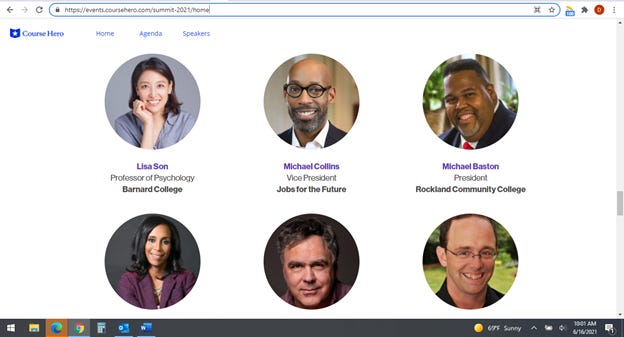Cheating Up 230% at Berkeley
Plus, the President of Rockland Community College is sticking with Course Hero. Plus, a 12-year old in UAE designs an anti-cheating solution.
Issue 34
Cal Berkeley Posts a 3x Increase in Cheating
In Issue 29, I wrote about cheating at the University of California, Berkeley. Now, thanks to reporting in The Daily Californian, we have numbers.
The paper cites Becca Lopez, director of Berkeley’s Center for Student Conduct. Noting that colleges around the country had experienced increases in academic dishonesty since remote instruction began, Lopez added,
The number of academic misconduct reports submitted to the Center for Student Conduct in the Fall of 2020 was about 230% higher than the previous Fall 2019 semester
A separate spokesperson for the school confirmed the number, adding that for Fall 2019, the school:
received about 156 reports of academic misconduct and we received about 511 reports of academic misconduct in the Fall of 2020.
Kudos to Berkeley for sharing this information. More schools should.
The College President Who’s Speaking at That Course Hero Event
Noted cheating company Course Hero is hosting an “education summit” next month. Course Hero sells a monthly subscription to course-specific academic material such as essays, tests, syllabi, and class assignments and offers a service that provides answers to academic questions, “in as few as 15 minutes.”
Many schools ban using Course Hero and similar pay-for-answers sites. At least one school has the site blocked to students, having “designated Course Hero as academic fraud.” At the last conference of the International Center for Academic Integrity, there was an entire presentation on how schools could counter Course Hero specifically.
Against that reality, the President of Rockland Community College (NY), Dr. Michael Baston, is listed as a “featured speaker” at the upcoming Course Hero summit.
It’s an unusual look for a college president to be featured under the banner of a company that sells homework and test answers. It’s not an abstract concern. A search of Course Hero showed 3,944 documents across 80 departments from Rockland, including complete and partial papers, tests and homework assignments - all accessible to any student with a debit card.
When asked if representing his school at an event with a cheating company was inappropriate or sent a confusing message to students regarding acceptable academic conduct, a college spokesperson gave two separate answers. Neither answer addressed academic intergrity or any potential impropriety. The closest thing to a responsive answer was that, “Dr. Baston does not represent Course Hero.”
Yet, there he is, under their logo, as a “featured speaker” at their event.
I also asked twice whether Dr. Baston had been or was being paid by Course Hero, as another of the event’s speaker has been. The spokesperson did not give an answer either time.
I also asked if Rockland Community College could share any data regarding academic misconduct at the school. The spokesperson said, “RCC does not publicly disclose any incidents regarding integrity or misconduct.”
Students are being caught using Course Hero to cheat every day. And I feel terrible for any student who saw their college’s president or a professor from their school speaking at a Course Hero event and thought, “this must be legit and approved.” And I do not know why anyone would willingly put their students in that position.
12-year Old in UAE Develops His Own Anti-Cheating Technology
Responding to the need to secure online exams during remote learning, a science teacher asked a tech-savvy 12-year old to design an anti-cheating system. He did.
Gulf News has this story. From their coverage, the grade 8 student:
created an anti-cheating guard for online exams that alerts the school if a student is straying away from the exam site to access other websites or documents.
The new tool, the reporting says:
notes the specific time the student was away and then automatically sends an immediate email alerting the invigilator with specific time logs.
It may be quite good too. The article continues that the school’s IT team has not been able to get around the student’s solution. The student said,
With this capability, invigilators can now assess larger patterns that can help identify, warn repeat offenders and, in the long-run, reduce the incidence of such events
In the next “The Cheat Sheet” - University of Auckland has some cheating issues. A supposed privacy group comically tries to go after remote test proctoring, which is fantastic. And, of course, more cheating.
Sign up and share “The Cheat Sheet” below.

